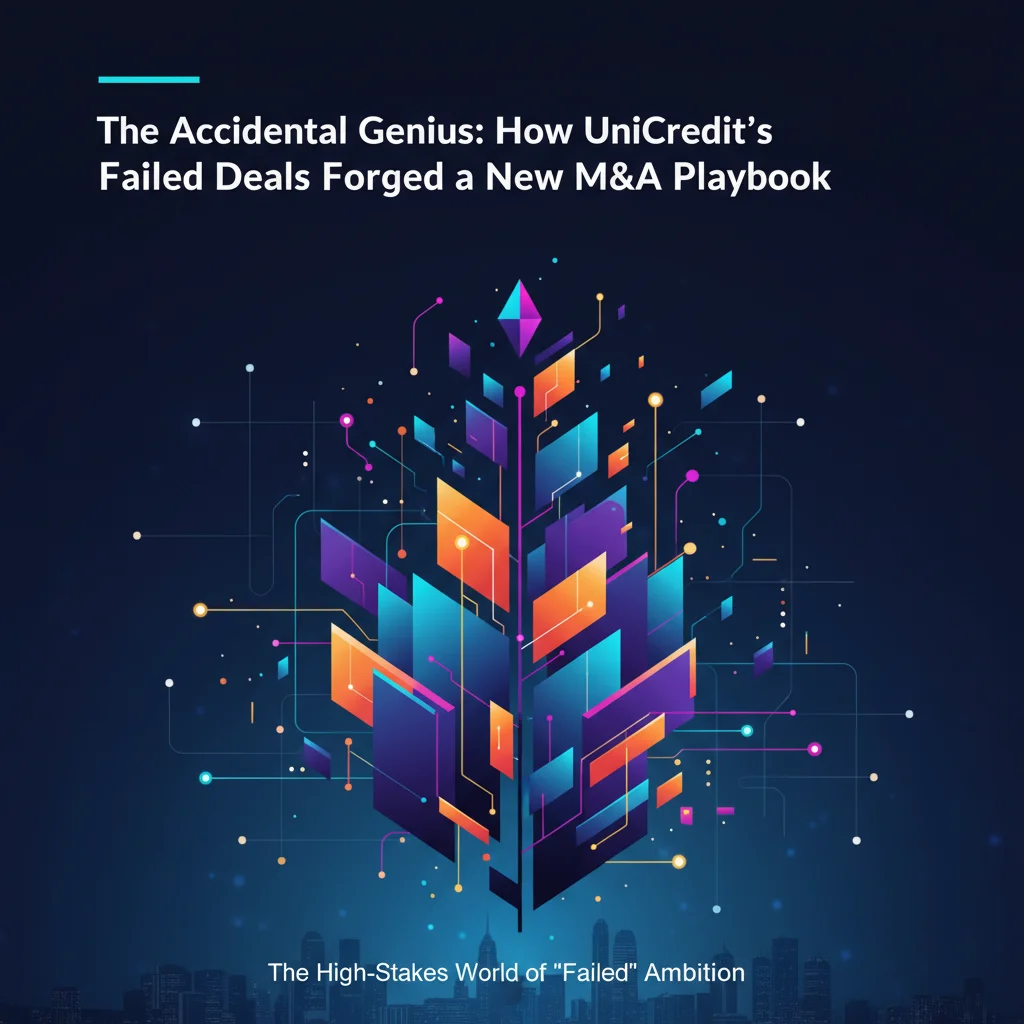
The Accidental Genius: How UniCredit’s Failed Deals Forged a New M&A Playbook
The High-Stakes World of “Failed” Ambition
In the cutthroat arena of corporate finance and investment banking, a failed merger or acquisition (M&A) is often seen as just that—a failure. It’s a public setback, a sign of miscalculation, or a strategic retreat. For UniCredit, one of Europe’s major banking institutions, and its high-profile CEO Andrea Orcel, the past few years have been marked by a series of such high-stakes pursuits that ultimately didn’t cross the finish line. From the complex political dance around Italy’s Monte dei Paschi to a potential tie-up with Germany’s Commerzbank, the headlines suggested a pattern of unfulfilled ambition.
However, a closer look reveals something far more nuanced and potentially revolutionary. What if these perceived failures are not failures at all, but rather the visible symptoms of a disciplined, patient, and highly strategic new playbook? UniCredit, perhaps unintentionally, is becoming a role model for a different kind of corporate expansion: the art of the strategic minority stake. This approach, which involves building financial exposure to a business you don’t control, sidesteps the colossal risks of full-blown mergers while retaining significant strategic advantages. It’s a masterclass in playing the long game in an increasingly volatile global economy, with profound implications for banking, investing, and the future of corporate growth.
Europe’s Banking Puzzle: The Unwinnable Game of Consolidation
For decades, analysts and economists have called for consolidation within Europe’s fragmented banking sector. Unlike the United States, which is dominated by a handful of national giants, the European landscape is a patchwork of national champions and regional players. This fragmentation creates inefficiencies, depresses profitability, and makes the continent’s banking system less competitive on a global scale. The logical solution, M&A, has proven to be a minefield.
Cross-border deals are notoriously difficult, often scuttled by a toxic cocktail of political interference, nationalistic pride, and labyrinthine regulatory hurdles. Even domestic mergers are fraught with complexity. It is within this challenging environment that UniCredit’s CEO, Andrea Orcel—a man renowned for his dealmaking prowess—has been operating. His inability to close a major deal, such as the proposed acquisition of Monte dei Paschi, was initially viewed as a significant stumble. According to the Financial Times, Orcel’s disciplined approach meant walking away when the terms weren’t perfectly aligned with shareholder interests, a move that requires significant fortitude.
This history of walking away from bad deals sets the stage for the bank’s current, more subtle strategy. It’s a pivot born from necessity, but one that may prove to be a stroke of genius in the modern financial ecosystem.
The Milei Tsunami: How Argentina's Election Unleashed a Global Market Shockwave
The New Playbook: From All-Out Acquisition to Strategic Influence
Instead of betting the farm on a single, transformative acquisition, UniCredit is now pursuing a strategy of “strategic optionality” by acquiring significant minority stakes in other financial institutions. By building up positions of, for example, 5% or 9% in a target company, the bank achieves several goals simultaneously without the immense capital outlay and regulatory nightmare of a full takeover. This represents a fundamental shift in M&A philosophy, prioritizing flexibility and influence over outright control.
To understand the profound difference in these approaches, consider the following comparison:
| Factor | Full Merger & Acquisition | Strategic Minority Stake |
|---|---|---|
| Capital Outlay | Extremely high; often requires significant debt and equity issuance. | Substantially lower; manageable within existing capital reserves. |
| Control | Full operational and strategic control. | Influence but no direct control; a seat at the table. |
| Regulatory Scrutiny | Intense and prolonged; requires multiple approvals and can be blocked. | Minimal to moderate; often below the threshold for major antitrust review. |
| Integration Risk | Very high; cultural clashes, IT system mergers, and staff redundancies. | None; the target company continues to operate independently. |
| Flexibility | Low; a highly committed, often irreversible decision. | High; the stake can be increased, decreased, or sold on the stock market. |
| Risk Exposure | Concentrated; the success of the entire bank is tied to the merger’s outcome. | Diversified; a financial investment with manageable downside. |
This table illustrates why the minority stake model is so appealing. It’s a lower-risk way to engage in the M&A game, allowing a company like UniCredit to gain a foothold, learn about a potential partner from the inside, and position itself for a future takeover if and when the conditions are perfect. This approach is common in the world of venture capital and financial technology, where large corporations often invest in nimble fintech startups, but it is a relatively novel strategy for a large, established bank eyeing its peers.
Beyond the Handshake: How the US-Japan Rare Earths Pact is Reshaping Global Finance and Tech
The Double-Edged Sword: Balancing Risk and Reward
Of course, this strategy is not without its perils. The primary drawback is the fundamental lack of control. As a minority shareholder, UniCredit can influence but not dictate the target company’s strategy. If the target makes a poor decision, UniCredit’s investment suffers, and its ability to intervene is limited. The value of the stake is subject to the whims of the stock market, introducing a level of trading volatility that a full owner would not face in the same way.
There’s also the “awkward dinner guest” problem. A large, influential minority shareholder can create tension in the boardroom and unsettle management, who may feel they are perpetually under audition for a future takeover. This was a concern when UniCredit built its stake in Banco BPM, leading to speculation that a full bid was imminent (source).
However, the rewards are equally compelling. Beyond the financial upside from a well-placed investment, these stakes serve as a powerful strategic tool. They can:
- Deter Rivals: A significant stake acts as a poison pill, making the target less attractive to other potential suitors.
- Facilitate Collaboration: It opens doors for partnerships in areas like financial technology, payment systems, or asset management, creating synergies without the messiness of a full merger.
- Provide Invaluable Intelligence: Being a major shareholder grants access to information and insights that an outsider could never obtain, de-risking a potential future acquisition.
This calculated balance of risk and reward is the core of UniCredit’s accidental genius. It’s an investing strategy that acknowledges the harsh realities of the modern economy while still pursuing ambitious growth.
Wider Implications: A New Model for a Volatile World?
The UniCredit playbook has ramifications that extend far beyond European banking. It offers a blueprint for any company in any industry grappling with how to grow in an era of high interest rates, geopolitical uncertainty, and intense regulatory oversight. The principles of this approach could be applied across the board.
In the tech world, we already see giants like Microsoft and Google taking large minority stakes in AI and fintech startups. This allows them to tap into cutting-edge innovation without stifling the startup’s agile culture through a full acquisition. In the energy sector, major players could use this model to invest in renewable technology companies, gaining exposure to the green transition without immediately overhauling their core business.
This strategy could even be enhanced by emerging financial technology. Imagine a future where corporate stakes are tokenized on a blockchain, allowing for even more granular and liquid forms of strategic investment and partnership. The core concepts of decentralization and fractional ownership, central to the world of blockchain, align perfectly with the flexibility of the minority stake model.
For investors, this trend is critical to watch. It changes the dynamics of the stock market, creating a class of companies that are permanently “in play” and influenced by large, strategic backers. It requires a deeper analysis of shareholder lists and the motivations behind large institutional investments. It’s no longer just about the economics of a company, but also about the complex web of strategic alliances it is a part of.
Conclusion: The Wisdom of a Well-Played Hand
UniCredit’s journey demonstrates a powerful lesson in modern corporate strategy: success is not always defined by blockbuster deals and headline-grabbing acquisitions. In a complex world, the most intelligent move is often the one that preserves flexibility and creates future options. By turning its M&A “failures” into a portfolio of strategic investments, UniCredit has traded the binary risk of a single big bet for the diversified, long-term potential of multiple strategic partnerships.
This isn’t just a story about a bank; it’s a story about adaptation. It’s a testament to the idea that sometimes, the most powerful position is not one of absolute control, but of strategic influence. As business leaders and investors navigate the turbulent waters of the global economy, UniCredit’s accidental role as a pioneer of patient, strategic investing may prove to be one of the most important case studies of our time.


